

Freddie Gray case: Motion to dismiss charges denied. Wednesday's pretrial hearing came almost five months after Gray suffered a fatal spinal injury in custody while being transported in a police van.
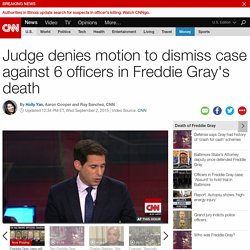
Attorneys for the six Baltimore police officers charged in Gray's death appeared in court for the hearing while the city braced for what could happen afterward. Andrew Graham, an attorney for Officer Caesar R. Goodson Jr., told Circuit Court Judge Barry G. Williams that Mosby was reckless and unprofessional by pressing for convictions in an attempt to restore order in Baltimore when she announced the charges in May. Mosby's comments make a fair trial "impossible," said Graham, who likened the prosecutor's announcement of the charges against the officers to a "pep rally. " "She was urging everyone, including potential jurors, to exact vengeance," he said.
In announcing the charges, Mosby said: "Mr. The six officers face charges ranging from assault to vehicular manslaughter. The trial of the "Freddie Gray Six" is scheduled to begin in October. In Baltimore and other cities, police have used 'rough rides' as payback in the past. For about 44 minutes, a police wagon carrying a handcuffed Freddie Gray traveled the city's streets.
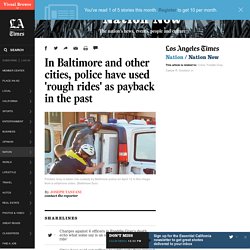
By the time it arrived at a police booking station, Gray had stopped breathing, suffering from a catastrophic spinal injury that would kill him a week later. Now, the six officers who were involved in Gray's death have been arrested — with the most serious charge, second-degree murder, falling on the driver of the van, Officer Caesar Goodson Jr. Prosecutors say Gray, left unsecured and shackled on his stomach on the floor of the van, suffered his “severe and critical neck injury” during the trip. But Gray, 25, whose death has sparked riots here and protests across the country, is not the only suspect to exit a police van in far worse shape than when he went in. This brand of street payback, sometimes handed out when suspects ran or gave the cops a hard time, goes by different names: Here, it's known as “the rough ride.” The van made four stops before getting to the police booking station.
Breaking: Criminal Charges to be Filed Against Police Officers in Freddie Gray Case. Maryland State Attorney Marilyn J.
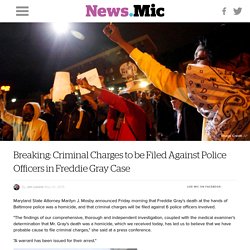
Mosby announced Friday morning that Freddie Gray's death at the hands of Baltimore police was a homicide, and that criminal charges will be filed against 6 police officers involved. "The findings of our comprehensive, thorough and independent investigation, coupled with the medical examiner's determination that Mr. Gray's death was a homicide, which we received today, has led us to believe that we have probable cause to file criminal charges," she said at a press conference. What is 'depraved-heart' murder? Rep.
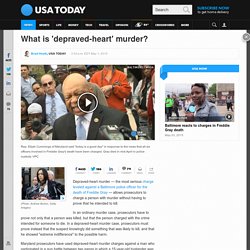
Elijah Cummings of Maryland said "today is a good day" in response to the news that all six officers involved in Freddie Gray's death have been charged. Looting And Rioting? First Responders Remember 1968. Michel Martin's father was a New York City firefighter in 1968, when race riots erupted in neighborhoods across the city and country.
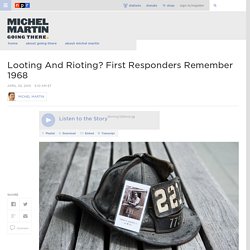
His memorial card sits on his dented helmet from those years. 7 Facts Everyone Needs to Know to Understand What's Happening in Baltimore. Freddie Gray died on April 19, one week after he was taken into custody by Baltimore police.
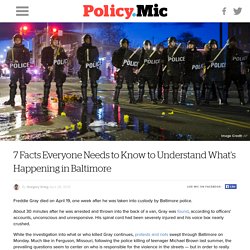
About 30 minutes after he was arrested and thrown into the back of a van, Gray was found, according to officers' accounts, unconscious and unresponsive. His spinal cord had been severely injured and his voice box nearly crushed. While the investigation into what or who killed Gray continues, protests and riots swept through Baltimore on Monday. Freddie Gray not the first to come out of Baltimore police van with serious injuries.
When a handcuffed Freddie Gray was placed in a Baltimore police van on April 12, he was talking and breathing.
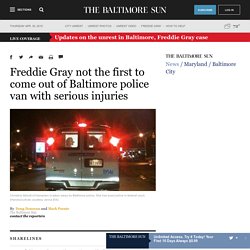
When the 25-year-old emerged, "he could not talk and he could not breathe," according to one police official, and he died a week later of a spinal injury. But Gray is not the first person to come out of a Baltimore police wagon with serious injuries. Relatives of Dondi Johnson Sr., who was left a paraplegic after a 2005 police van ride, won a $7.4 million verdict against police officers. Undue force - Sun Investigates - The Baltimore Sun. The Sun’s findings include only lawsuits that have been settled or decided in court; dozens of similar cases are still pending.
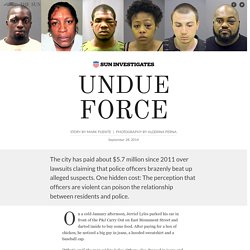
The city has faced 317 lawsuits over police conduct since 2011 — and recently budgeted an additional $4.2 million for legal fees, judgments and lawsuits, a $2.5 million increase from fiscal 2014. “This is not something I take lightly,” Rawlings-Blake said. “I’ve worked hard, very hard, to have a dialogue with the community about how do we build trust and send the message that law enforcement that acts outside of the law will not be tolerated.” Police Commissioner Anthony W. Batts, who took over in late 2012, has publicly vowed to eliminate misconduct among the city’s 2,800 officers. Lloyd Fox Deputy Commissioner Jerry Rodriguez leads the bureau tasked with keeping police officers accountable. “We will not let officers get away with any wrongdoing,” Rodriguez said. But Robert F. “Our officers are not brutal,” he said. “Grandma, call the ambulance. “What happened? Rightinvestment_design_2.23.15_final.
Police: Freddie Gray didn't get timely medical care after arrest. Police Commissioner Anthony Batts told reporters there are no excuses for the fact that Gray was not buckled in as he was transported to a police station.
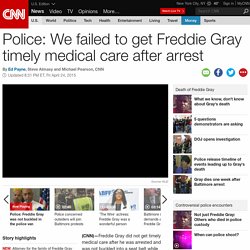
Five days after Gray's death and amid ongoing protests, police officials acknowledged mistakes were made during and after his arrest. Gray, who was stopped April 12 after a foot pursuit through several housing complexes, should have received medical attention at the scene of his arrest, said Deputy Police Commissioner Kevin Davis. Mach-2 comments on This man really hit the nail on the head when it comes to the situation in Baltimore.
Baltimore erupts in riots after funeral of man who died in police custody. Baltimore protests Baltimore erupted in violence on Monday as hundreds of rioters looted stores, burned buildings and injured at least 15 police officers following the funeral of a 25-year-old black man who died after he was injured in police custody.
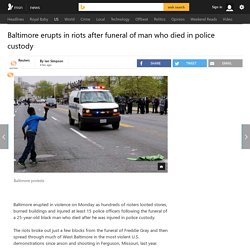
The riots broke out just a few blocks from the funeral of Freddie Gray and then spread through much of West Baltimore in the most violent U.S. demonstrations since arson and shooting in Ferguson, Missouri, last year. A large fire consumed a senior center under construction near a church in East Baltimore on Wednesday night, television reports showed, but it was not immediately clear if it was related to the riots. Maryland Governor Larry Hogan declared a state of emergency and activated the National Guard as firefighters battled blazes set by looters. Police made at least 27 arrests and Baltimore schools said they would be closed on Tuesday. Later, while scenes of riots were broadcast on television, she briefed President Barack Obama.
As Riots Follow Freddie Gray's Death in Baltimore, Calls for Calm Ring Hollow. Rioting broke out on Monday in Baltimore—an angry response to the death of Freddie Gray, a death my native city seems powerless to explain. Gray did not die mysteriously in some back alley but in the custody of the city's publicly appointed guardians of order.
And yet the mayor of that city and the commissioner of that city's police still have no idea what happened. I suspect this is not because the mayor and police commissioner are bad people, but because the state of Maryland prioritizes the protection of police officers charged with abuse over the citizens who fall under its purview. The citizens who live in West Baltimore, where the rioting began, intuitively understand this. I grew up across the street from Mondawmin Mall, where today's riots began. Over the past four years, more than 100 people have won court judgments or settlements related to allegations of brutality and civil rights violations. The people now calling for nonviolence are not prepared to answer these questions.